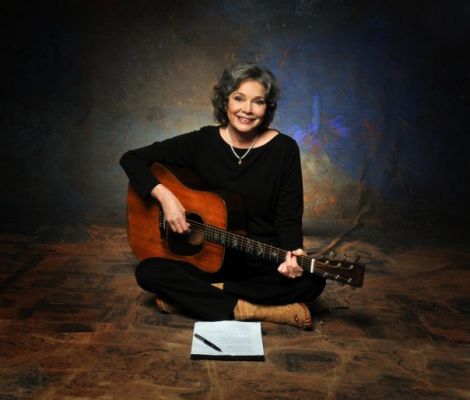Home > News
08/15/2021
The Last of the True Believers: A Farewell to Nanci Griffith
By ART LEVINE // The news of folk singer Nanci Griffith's death struck me like one of her songs, a gentle arrow straight to the heart.
The news of folk singer Nanci Griffith's death struck me like one of her songs, a gentle arrow straight to the heart.
She was 68. Her management company, in keeping with her low-profile style, didn't disclose the location or cause of death for now: “It was Nanci’s wish that no further formal statement or press release happen for a week following her passing.”
I hadn't thought much about Nanci Griffith recently, because there was no need to: Her music had become nearly as much a part of my life as any cup of tea I make before sitting down to work, her best songs on an endless loop streaming from my Amazon Echo. She had a repertoire of melodic originals and cover songs -- and evocative lyrics -- that go far beyond those that became hits for others, such as "Love at the Five and Dime" and Julie Gold's "From A Distance." Indeed, that latter song -- even if seen as hokey by some cynics -- reflects a hope and spiritual longing that later became a huge smash for Bette Midler, with a message that is needed now more than ever.
It became the title of the excellent 22-song anthology album in 2012, "From A Distance: The Very Best of Nanci Griffith," that draws on both her mainstream MCA albums and live versions of the best songs from her earlier indie Rounder albums, such as Last of the True Believers, a creative streak that some critics think produced her best work. These include the "Five and Dime" song that became hit for Kathy Mattea; "Once in a Very Blue Moon;" and "There's A Light Beyond These Woods (Mary Margaret)," drawn from her first album. That was a low-cost album cut in 1978 by a small local Austin label, giving Griffith the confidence to leave her job as a kindergarten teacher, as noted in the Allmusic.com biography of Griffith. But many of her best songs blending country and folk were produced on MCA as well, including "Lone Star State of Mind" and "Trouble in the Fields." (In fact, her career evolution is well-charted in these series of appearances from 1988 onwards in her regular appearances on David Letterman's show, who had an eye for under-appreciated American talent from comedian Bill Hicks to Griffith.)
It's not as widely known, but for much of her career, she also was deeply and often quietly immersed in progressive politics and causes, performing at fund-raisers for the ACLU and against anti-gay legislation and working on the Texas gubernatorial campaigns of Anne Richards. Even so, for instance, her fury at prejudice was clearly expressed in a deceptively sweet and beguiling way in the song recounting one visit to Ireland, the country that loved her best, as a back-seat passenger with a bigoted taxi driver, "It's A Hard Life Wherever You Go;" she considered it, justly, as among her finest work. (Her final album, Intersection, before she retired a few years ago, had songs that more openly expressed personal rage and political discontents, but she never stooped to flaunting her illnesses for public sympathy, including bouts with cancer, or romantic turmoil, on social media.)
She was a younger -- and arguably the prettiest female -- creative member of the original 1970s Austin songwriting scene that included such pioneers as Guy Clark, Lyle Lovett, Steve Earle and Townes Van Zandt, the Americana version of Paris in the 1920's. Van Zandt's song "Tecumseh Valley" inspired her own song-writing when she was a teenager and she included it in a duet with Arlo Guthrie in her 1993 Grammy-winning masterpiece of folk song covers, Other Voices, Other Rooms, a perfect album that ranks among the best folk albums ever.
She is a true inheritor of the Townes Van Zandt tradition. She dueted with the Townes on "Tecumseh Valley" in the 1990s Americana TV series directed by violinist Mark O'Connor, the American Music Shop. The spirit of deep emotion and artistic dedication regardless of commercial success that marked Van Zandt is also apparent in the life of Nanci Griffith. For example, during this Austin City Limits all-star tribute to Townes which included far better known musicians such as Emmylou Harris and Willie Nelson, you can see after the 9:28 minute mark Nanci openly weeping during Steve Earle's tribute song to Townes crafted during his own trip to Ireland; at the 14:30 mark she slays the audience and the stars around her with her moving version of "Tecumseh Valley," the story of a young woman falling into hard times after her hopes were smashed. Indeed, the power of music -- especially Van Zandt's music-- to unleash tears and powerful emotions has perhaps never been more evident than in this excerpt from the obscure documentary on the early Texas songwriter scene, Heartworn Highways, when Townes debuts in his run-down kitchen the song, "Waiting Around to Die," for his elderly African-American neighbor, "Uncle" Seymour Washington, who can't help but cry at this music from a young white man expressing the buried sadness of Seymour's life now.
Other Voices, Other Rooms was named after a Truman Capote collection of short stories, and that serves as yet another signal of Griffith's elevated literary standards and her curator's ear for great songs that rivals Emmylou Harris and T-Bone Burnett. The album includes, among others, the work of John Prine, Woody Guthrie, Jerry Jeff Walker and Bob Dylan, who even played harmonica on his song, "Boots of Spanish Leather." (Her cover version of that song, I believe, ranks in the upper tier of Dylan covers along with those of Jimi Hendrix, The Band and Bettye LaVette's "Things Have Changed.")
Other Voices, Other Rooms was produced for the legendary Elektra record label, which had helped fuel the folk and intelligent rock boom of the 1960s, after she left MCA, and it sparked a revival in her career. Yet she never achieved nor had the hard-driving approach to career success -- no matter how well-masked -- that marked such literate and more celebrated Americana/country-styled female songwriters as Roseanne Cash and Lucinda Williams. Indeed, the only time I ever saw Nanci Griffith live was in 2006 when she was just another one of the Gulf Coast roots music and jazz musicians featured as part a free open house at the Kennedy Center in Washington, D.C., singing on a corner stage at 6 p.m. on the roof of the arts center as people milled around with drinks and snacks in their hands, only some of us paying close attention to the national treasure in our midst. As I recall, one of my friends I brought along to see the great Nanci Griffith had to leave a bit early for other obligations before her set ended.
Yet for those who loved true American originals and gorgeous, hear-rending music without needing the flash and promotion of the modern pop scene, she was revered as both a person and an artist, especially by her fellow musicians who knew her best or admired her from afar. Jason Isbell spoke for many of us when he said in response to her passing, "Nanci Griffith wrote such beautiful songs. I didn’t know her, but I believe it must be true that she had a big beautiful heart. You can hear it". Suzy Bogguss, an acclaimed country singer from the 90s who had a big hit with Nanci Griffith's "Outbound Plane," perhaps said it best on an Instagram post:
"My heart is aching. A beautiful soul that I love has left this earth. I feel blessed to have many memories of our times together along with most everything she ever recorded. I’m going to spend the day reveling in the articulate masterful legacy she’s left us..."
As for me, I'll start remembering her by playing yet again the opening song of Other Voices, Other Rooms, an artful exploration of memory and loss written by Kate Wolf: "Across the Great Divide." RIP, Nanci Griffith.
Comments
David McCaffrey
Her sad passing, at such an early age, is all the more deeply felt because of what we have lost and what she could have achieved if she had stayed longer. So there is grief for what we have lost but pleasure at the huge repertoire of music that she has left us. A fan from her earliest days I had the please of seeing her , with her Blue Moon Band here in the U.K. at Bristol in the early 1990s and she filled the full house in the hall with her lovely, haunting music for nearly three hours.
For those seeking some lost gem of hers that is rarely given the air time that it deserves may I suggest that you listen to “Radio Fragile” her wonderfully evocative tribute to Phil Ochs written with James Hooker. What a wonderful interpreter of so many songs she was. Your tribute to her is a worthy piece of writing n - thank you.









Linda Roundy
Thank you for the beautiful tribute to Miss Nanci. I fact, I am from SLC, UT. I did have 5 restless children, and I drove a Ford Econoline. We will miss you.